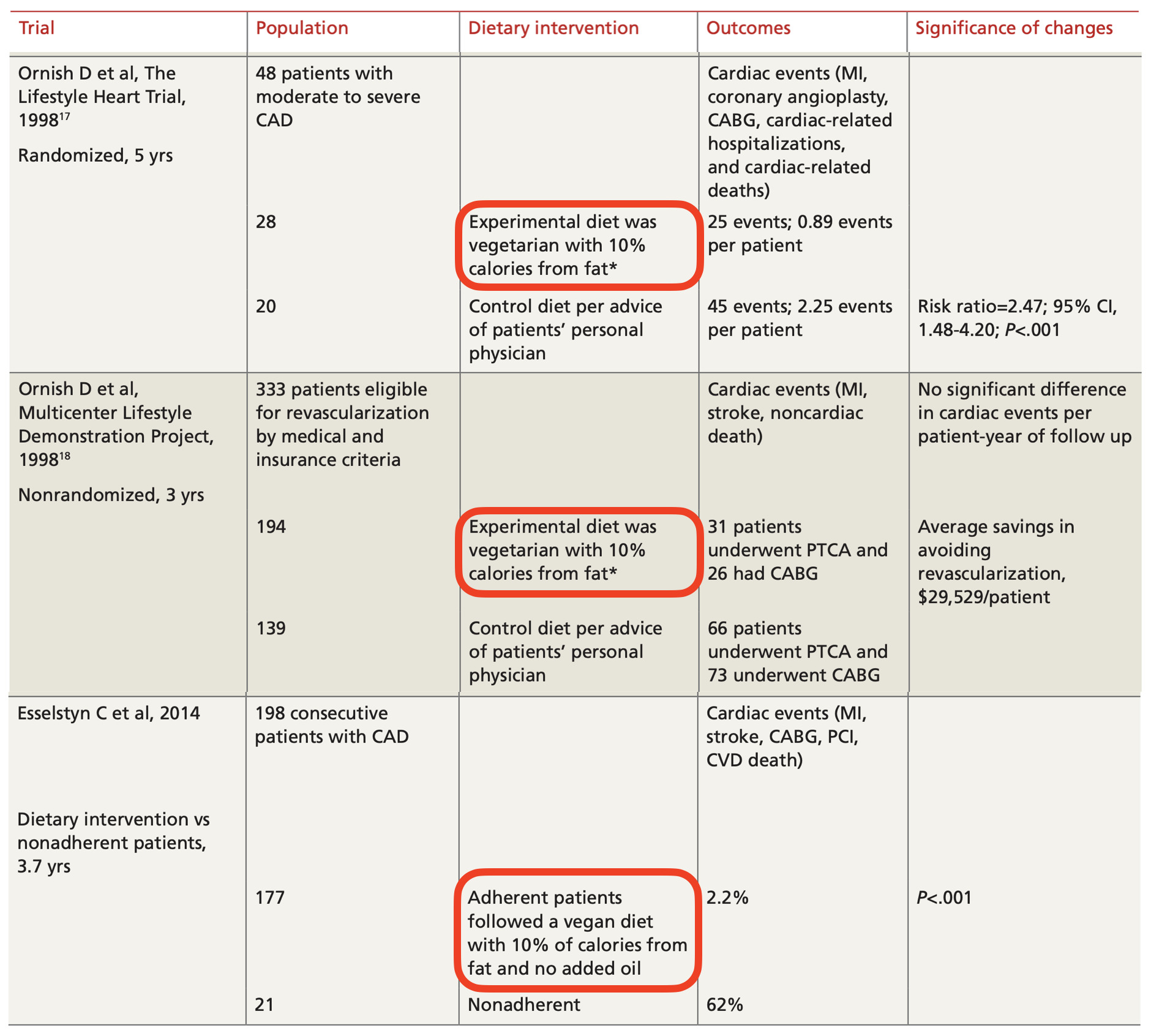In the article In Cholesterol Lowering, Moderation Kills (Cleve Clin J Med 2000 Aug;67(8):560-4, also available at Dr Esselstyn's website), Dr Esselstyn says:
Table W3 of A way to reverse CAD? by Esselstyn et al, J Family Practice, Vol 63, No 7, 2014 (available at Dr Esselstyn's website) on pages 364a-364b summarizes trials by both Dr Ornish and Dr Esselstyn; the target fat percentage in all of these landmark studies was 10%.
More info: Dr Esselstyn: Can We Become Heart Disease Proof? summarizes Dr Esselstyn's studies. The Emphasis on Low Fat showcases the recommendations of multiple Whole Food Plant-Based doctors and researchers — many of them recommend 10% to 15% total fat intake. EFAs (Essential Fatty Acids) are a complex topic; see articles in this section: Essential Fatty Acids.
Studies on nuts show that nuts are awesome! Nuts help us lose weight, lower cholesterol levels and promote health in many other ways! Still, the question remains: how many nuts and seeds should we eat? Only a few tablespoons, or several handfuls daily?
Whole Food Plant-Based luminaries suggest that total fat intake be in the ballpark of 10% to 15% of total calories. See The Emphasis on Low Fat.
What does Dr Esselstyn recommend?
Dr Esselstyn FAQ says:
Dr Esselstyn makes three main points:
(1) Nuts are addictive: At offset 0:50 of this video, Dr Esselstyn says,
(2) Lack of studies on heart disease reversal with nuts:
We don't have studies showing that WFPB + nuts reverses heart disease. In future, such a study may emerge and it may turn out that eating extra nuts & avocados is just fine for heart disease reversal. However, so far, we don't have such a study — this is a gap in scientific knowledge as of 2021.
(3) EFAs from flax & chia: Dr Esselstyn says that we can get sufficient amounts of Essential Fatty Acids (EFAs) from 1-2 tbsp ground flax and chia. This is explored in a section below.
Essential Fatty Acids (EFAs) are those which our body cannot produce, so we need to consume them via diet. Dr Esselstyn encourages a low fat system in which we avoid all high fat foods like nuts, nut butters, coconut, avocado, coconut and even seeds (with the exception of flax, chia, hempseed). Details in Dr Esselstyn's FAQ.
Omega 3's — How May I Get My Omega 3's? This article explains:
Seeds (sunflower, pumpkin, sesame, etc.) Are seeds ok to eat? This article explains:
Fish Oil — Should I take fish oil? This article explains:
Flax Seed Oil/ Flax Seed Meal/ Chia Seeds — What about flax seed oil? This article explains:
These points are echoed in support groups for Dr Esselstyn's guidelines, and in videos by Ann and Jane Esselstyn:
"A few seeds are fine. 1 tbsp chia or flaxseed. Flaxseed need to be ground. Even some sesame seeds or pumpkin seeds are fine. Don't eat handfuls / cupfuls." —offset 15:27 of Jane & Ann's video."1-2 Tablespoons ground flaxseed and/or chia seeds daily, maximum of 2 tablespoons " — FaceBook Support Group (2020).
"Avoid all high fat foods like nuts, nut butters, coconut, avocado, coconut, seeds (see flaxseed/chia reference below) An olive or two as a condiment is fine. Tofu can be eaten occasional, although occasionally has not been defined." (from this FaceBook Group).
"For heart disease patients, steer clear of nuts, avocado and coconut." If you don't have heart disease, a handful (1/4 cup) of nuts is fine, especially walnuts. See offset 13:11 of Jane & Ann's video.
Coconut Milk: At offset 13:44 of Jane & Ann's video, Ann focuses her attention on coconut milk! She opens a can of coconut milk and explains that it's loaded with saturated fats! Ann also mentions that vegan ice creams and vegan yogurts often have coconut milk or coconut cream! See Point 9 in Ann Esselstyn's article from 2013.
Coconut Milk, Coconut Cream & Indian Cuisine: I have noticed that a lot of my Indian friends gravitate towards recipes with coconut milk! Please browse through Saturated Fats in Coconuts to understand why coconut milk is highly discouraged for heart health.
Coconut Extract: Those who love coconut in their meals may buy coconut extract; it imparts coconut flavor.
- Dr Esselstyn: TED Talk & Lectures
- Dr Esselstyn: Can We Become Heart Disease Proof?
- Dr Esselstyn's strict Whole Food Plant-Based dietary guidelines
What do other Whole Food Plant-Based luminaries say about oil, fats, nuts, seeds and avocados?
- Fats and Essential Fatty Acids explain how we approach fats in Whole Food Plant-Based circles.
- Nuts & Seeds
- No Oil!

 Instagram
Instagram YouTube
YouTube